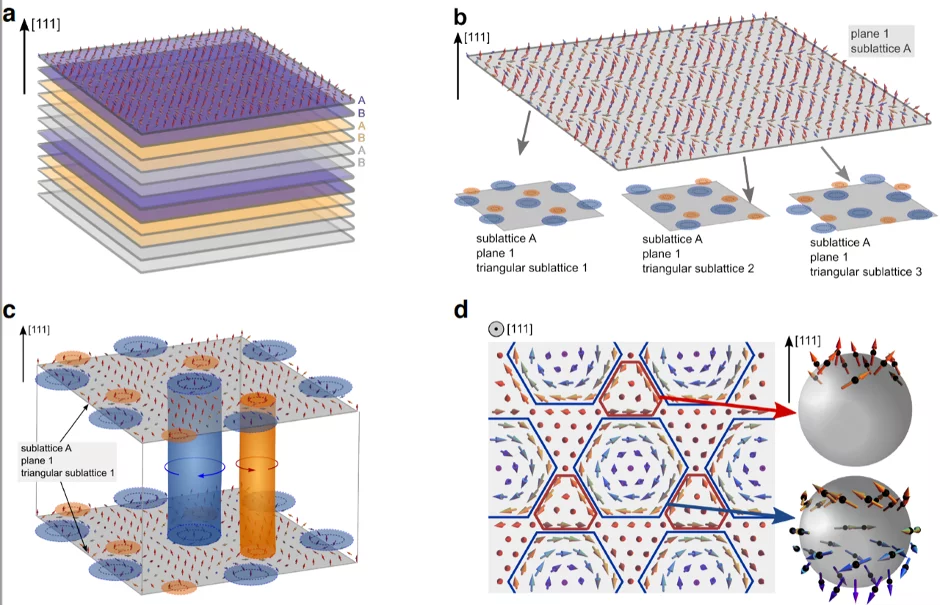Antiferromagnetic (AFM) materials with non-collinear spin configurations and non-trivial topological features are presently in the focus of intense research. They have great potential as magnetic information carriers, reveal novel non-trivial states of matter and identify new underlying interaction mechanisms. We search for such materials within frustrated magnets with magnetic ions located on triangular or Kagome lattices by means of neutron scattering.
One celebrated example in an AFM spinel, MnSc2S4. The system was studied in the context of a spiral spin liquid [1] which undergoes a multi-step ordering below TN = 2.3 K. In zero magnetic field, the magnetic structure can be described with a single propagation vector k= (3/4 3/4 0) forming multiple domains. In magnetic field the helical structure transforms into a triple-k state, which is the first fractional antiferromagnetic skyrmion lattice (SkL) [2] (Figure).
Another potential candidate for non-trivial topology is a MGa2S4 family (M=Ni, Fe). A set of unconventional magnetic properties observed experimentally boosted a large number of theoretical work including the triangular lattice AFM –, the spin-nematic quadrupolar – and the Z2-vortex – models. For a certain set of exchange parameters a skyrmion crystal multi-k state was predicted. Recently [3] it was possible to unfold the magnetic properties, as originating from ideal and non-ideal structure of the MGa2S4 and the exploration of the ideal system is now tackled.
YbAgGe contains a magnetic geometrically frustrated kagome-like lattice of Yb3+ ions with significant local single-ion anisotropy. Its electronic state arises from hybridization of 4f and conduction electrons leading to heavy electronic masses. Entanglement of these interactions leads to non-trivial behavior under external magnetic field [4] and topologically non-trivial states.
Collaboration
- Dr. Vladimir Tsurkan, Lehrstuhl für Experimentalphysik V, Universität Augsburg , Germany
- Prof. Daniel Cabra and Prof. Hector Diego Rosales, Instituto de Fisica la Plata – Conicet, Argentina
Funding
- SNSF Projects No. 200021-140862, No. 200020-162626, No. IZ73Z0_152734, No. 200020-182536, Spirit IZSTZ0_202603
- Centro Latinoamericano-Suizo (Seed money grant No. SMG1811)
Associated junior researchers
- Shang Gao, PhD thesis 2017
- Guratinder Kaur, PhD thesis 2021
- Camilla Larsen, PostDoc
Publications
-
Gao S, Zaharko O, Tsurkan V, Su Y, White JS, Tucker GS, et al.
Spiral spin-liquid and the emergence of a vortex-like state in MnSc2S4
Nature Physics. 2017; 13(2): 157-161. https://doi.org/10.1038/nphys3914
DORA PSI -
Gao S, Rosales HD, Gómez Albarracín FA, Tsurkan V, Kaur G, Fennell T, et al.
Fractional antiferromagnetic skyrmion lattice induced by anisotropic couplings
Nature. 2020; 586: 37-41. https://doi.org/10.1038/s41586-020-2716-8
DORA PSI -
Guratinder K, Schmidt M, Walker HC, Bewley R, Wörle M, Cabra D, et al.
Magnetic correlations in the triangular antiferromagnet FeGa2S4
Physical Review B. 2021; 104(6): 064412 (13 pp.). https://doi.org/10.1103/PhysRevB.104.064412
DORA PSI -
Larsen CB, Canévet E, Mazzone DG, Rüegg C, Fåk B, McMorrow DF, et al.
Ubiquity of amplitude-modulated magnetic ordering in the H-T phase diagram of the frustrated non-Fermi-liquid YbAgGe
Physical Review B. 2021; 104(5): 054424 (11 pp.). https://doi.org/10.1103/PhysRevB.104.054424
DORA PSI

